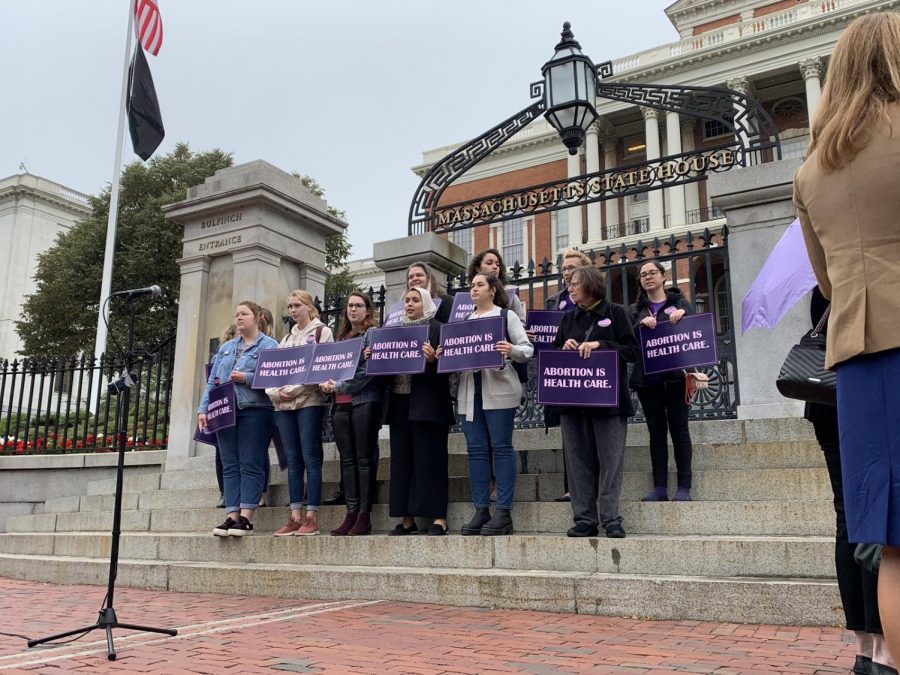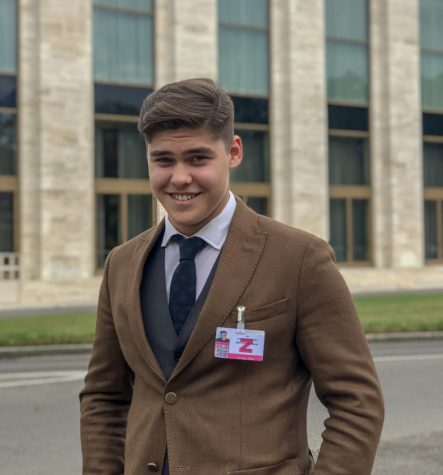On the morning of Oct. 1, a dozen female protesters stood on the stairs of the Massachusetts State House in support of the ROE Act, a piece of legislation proposed by State Senator Harriette Chandler that seeks to ensure that the state does not interfere in a woman’s right to have an abortion.
The protestors held signs saying ‘‘abortion is healthcare,’ surrounded by journalists and supporters. During the event, protesters remained serious and quiet, waiting for Boston Mayor Marty Walsh to announce his support for the ROE Act.
Walsh officially supported the act later that day.
“The ROE Act creates a safety net of coverage for those who are seeking abortion,” said Paul Heinzelmann M.D., medical director of Suffolk University’s Counseling Health & Wellness (CHW), in an interview with The Suffolk Journal.
The ROE Act’s main supporter is the Planned Parenthood League of Massachusetts.
Planned Parenthood strives to provide high-quality sexual health care across the nation, according to the organization’s website. There are four Planned Parenthood health centers around Massachusetts provide clinical services, education and advocacy for safe and legal abortions, according to the website.
The organization’s mission is to address issues of sex education, sexually transmitted infections and to eliminate barriers to healthcare in the state’s municipal elections this year.
Currently, CHW works to raise public awareness of sex related issues among students. The center provides free counseling, and distributes brochures and free condoms around the campus.
“I believe it’s critical to have an access to save abortions,” said Jean M. Joyce-Brady, director of counseling in CHW, in an interview with The Journal.
Joyce-Brady said it is crucial that young people living away from home have an access to reasonable medical treatment, and that CHW can provide students with all sorts of counseling, including any that pertains to sexual health.
“Women ought to have control over their bodies,” said Suffolk philosophy and ethics professor Alan Waters to The Journal.
Waters believes that legislation protecting women’s right for abortions should be implemented at the federal level. Currently, every state implements their own laws and regulations regarding abortions.
“It is really important that women are given autonomy over their own body,” said Catherine McCarthy, a freshman global and cultural communications major at Suffolk, in an interview with The Journal
Since abortion became legal in the US after the 1973 Supreme Court case Roe V. Wade, the topic has remained controversial. One of the main arguments against it is fueled by religion, according to US National Library of Medicine.
“Catholic churches will always advocate strongly for life,” said Fr. Chuck Cunniff, associate director of the Paulist Center in Boston, in an interview with The Journal.
Chuck said that the Catholic Church will stand against anything that runs “contrary to life,” even abortions in cases of rape and incest. However, he said that the Church’s doors are always open for those who are seeking help.
Another topic which is closely related to the problem of unwanted pregnancy is sex education.
Currently, sex education is not required in Massachusetts. Instead, school districts and schools can to make their own guidelines surrounding sex education.
Those guidelines, however, have no official standards. State law suggests that the guidelines should be developed under the supervision of at least one physician and take into account the opinion of community stakeholders and the parents.
“People in this country are not guaranteed reasonable sex education,” said McCarthy.
She said that due to the lack of reasonable standards of sex education across the nation, many adolescents do not receive clear information regarding sexually transmitted infections and unwanted pregnancy.
This could change, however.
“There’s been an increased effort to address sex education,” said Joyce-Brady.
Joyce-Brady said it is often hard to reach out to all students in our community, as not everyone finds this topic important.
“The idea is to have multiple means to share the information,” said Joyce-Brady, referring to lectures, numerous brochures and posters displayed on campus.
McCarthy believes that sex education meets many obstacles because it’s dictated by religion’s influence over people in power, as seen earlier this year when Alabama banned most abortions in the state.
According to the New York Times, Senator Clyde Chambliss, who spearheaded the law, said “When God creates the miracle of life inside a woman’s womb, it is not our place as human beings to extinguish that life.”
Chuck, however, has a different perspective than McCarthy.
“The Catholic Church has always advocated for [general] education,” said the priest.
He said many parents want to protect their children from harmful information and for some, this includes sex education.
“It’s very complex,” said Joyce-Brady. She believes that multiple variables impact individuals approach to sex education, including community, culture and religion.
Chuck said when children who were raised with conservative values get into high school without certain knowledge regarding sex education, this raise all sorts of issues. Some of which may lead to sexual-related problems.
For some parents who strictly follow religious teachings, even the simplest knowledge regarding reproductive health and intimate life would be considered sinful and harmful.
“They want to keep their children protected, so who tells them what sex-ed is?” said Chuck.
While The ROE Act gains more support from officials and citizens in Massachusetts, doctors remind that abortion bears consequences.
“Abortion will always be a medical procedure with its unique mental and physical issues,” said Heinzelmann.















